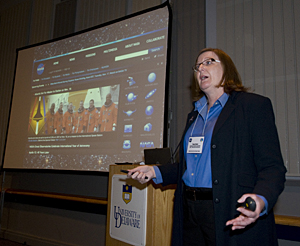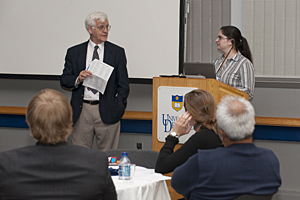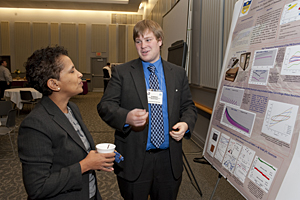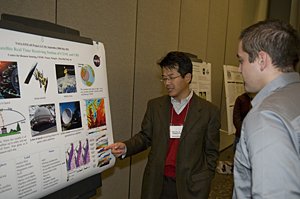

ADVERTISEMENT
- Rozovsky wins prestigious NSF Early Career Award
- UD students meet alumni, experience 'closing bell' at NYSE
- Newark Police seek assistance in identifying suspects in robbery
- Rivlin says bipartisan budget action, stronger budget rules key to reversing debt
- Stink bugs shouldn't pose problem until late summer
- Gao to honor Placido Domingo in Washington performance
- Adopt-A-Highway project keeps Lewes road clean
- WVUD's Radiothon fundraiser runs April 1-10
- W.D. Snodgrass Symposium to honor Pulitzer winner
- New guide helps cancer patients manage symptoms
- UD in the News, March 25, 2011
- For the Record, March 25, 2011
- Public opinion expert discusses world views of U.S. in Global Agenda series
- Congressional delegation, dean laud Center for Community Research and Service program
- Center for Political Communication sets symposium on politics, entertainment
- Students work to raise funds, awareness of domestic violence
- Equestrian team wins regional championship in Western riding
- Markell, Harker stress importance of agriculture to Delaware's economy
- Carol A. Ammon MBA Case Competition winners announced
- Prof presents blood-clotting studies at Gordon Research Conference
- Sexual Assault Awareness Month events, programs announced
- Stay connected with Sea Grant, CEOE e-newsletter
- A message to UD regarding the tragedy in Japan
- More News >>
- March 31-May 14: REP stages Neil Simon's 'The Good Doctor'
- April 2: Newark plans annual 'wine and dine'
- April 5: Expert perspective on U.S. health care
- April 5: Comedian Ace Guillen to visit Scrounge
- April 6, May 4: School of Nursing sponsors research lecture series
- April 6-May 4: Confucius Institute presents Chinese Film Series on Wednesdays
- April 6: IPCC's Pachauri to discuss sustainable development in DENIN Dialogue Series
- April 7: 'WVUDstock' radiothon concert announced
- April 8: English Language Institute presents 'Arts in Translation'
- April 9: Green and Healthy Living Expo planned at The Bob
- April 9: Center for Political Communication to host Onion editor
- April 10: Alumni Easter Egg-stravaganza planned
- April 11: CDS session to focus on visual assistive technologies
- April 12: T.J. Stiles to speak at UDLA annual dinner
- April 15, 16: Annual UD push lawnmower tune-up scheduled
- April 15, 16: Master Players series presents iMusic 4, China Magpie
- April 15, 16: Delaware Symphony, UD chorus to perform Mahler work
- April 18: Former NFL Coach Bill Cowher featured in UD Speaks
- April 21-24: Sesame Street Live brings Elmo and friends to The Bob
- April 30: Save the date for Ag Day 2011 at UD
- April 30: Symposium to consider 'Frontiers at the Chemistry-Biology Interface'
- April 30-May 1: Relay for Life set at Delaware Field House
- May 4: Delaware Membrane Protein Symposium announced
- May 5: Northwestern University's Leon Keer to deliver Kerr lecture
- May 7: Women's volleyball team to host second annual Spring Fling
- Through May 3: SPPA announces speakers for 10th annual lecture series
- Through May 4: Global Agenda sees U.S. through others' eyes; World Bank president to speak
- Through May 4: 'Research on Race, Ethnicity, Culture' topic of series
- Through May 9: Black American Studies announces lecture series
- Through May 11: 'Challenges in Jewish Culture' lecture series announced
- Through May 11: Area Studies research featured in speaker series
- Through June 5: 'Andy Warhol: Behind the Camera' on view in Old College Gallery
- Through July 15: 'Bodyscapes' on view at Mechanical Hall Gallery
- More What's Happening >>
- UD calendar >>
- Middle States evaluation team on campus April 5
- Phipps named HR Liaison of the Quarter
- Senior wins iPad for participating in assessment study
- April 19: Procurement Services schedules information sessions
- UD Bookstore announces spring break hours
- HealthyU Wellness Program encourages employees to 'Step into Spring'
- April 8-29: Faculty roundtable series considers student engagement
- GRE is changing; learn more at April 15 info session
- April 30: UD Evening with Blue Rocks set for employees
- Morris Library to be open 24/7 during final exams
- More Campus FYI >>
8 a.m., Nov. 17, 2009----The Delaware Space Grant Consortium (DESGC) held its annual symposium to highlight research work that has occurred as a result of funding support from the NASA Space Grant program on Thursday, Nov. 12, at the University of Delaware.
The Space Grant program was started by congressional mandate in 1989 in order to ensure that NASA would continue to have access to a well-trained workforce in the areas of interest to NASA's missions. These areas include science, technology, engineering and mathematics -- the so-called STEM fields -- and geography.
Each year since 1989, Congress has appropriated up to $40 million per year to NASA to administer the national Space Grant program. Within each state, a consortium of colleges, universities, and industrial partners works together to award fellowships, scholarships, and internships to graduate and undergraduate students in the STEM-G areas. Space Grant funds are also used for in-service training of pre-college teachers in those fields.
In Delaware, the consortium includes the University of Delaware, Delaware State University, Delaware Technical and Community College, Wilmington University and Wesley College.
During the current year, DESGC funds are supporting 11 graduate fellows, 17 undergraduate tuition scholars, 17 undergraduate summer researchers, two NASA interns and one industrial intern.
At the annual research symposium, graduate fellows and undergraduate research interns are required to present results, either orally or by poster, of their work during the past year. This year, in the presence of 50-60 attendees, 17 posters were presented and seven oral reports were received.
Alyssa Durney, a UD senior majoring in chemical engineering, had an industrial internship and worked at ILC Dover on improvements to the gloves worn by Space Shuttle astronauts. Her work at ILC Dover had a family connection, Durney said, noting, “My grandfather worked for ILC Dover on the Apollo spacesuits.”
Also reporting was Harry Shipman, Annie Jump Cannon Professor of Physics and Astronomy at UD, who has been funded by DESGC to offer professional development courses to STEM-G teachers in Delaware. Shipman reported on a course that helps math and science teachers in high schools and middle schools to find innovative ways to coordinate the teaching of their subject matter.
The opening address was given by Margaret M. Maher from NASA Goddard Space Flight Center. Maher is an aerospace education specialist whose job involves visiting pre-college schools to make the teachers familiar with the resources available from NASA to improve teaching of the STEM-G subjects.
“The favorite aspect of my job is talking to NASA researchers about their work,” Maher said. In particular, she mentioned conversations with the project scientist of a NASA satellite known as the Solar Dynamics Observatory, Dean Pesnell, a UD graduate who received a bachelor's degree in physics in 1978.
Maher informed the audience that NASA/Goddard, which includes a workforce of several thousand scientists and engineers, is committed to setting aside as many as 50 percent of its new hires to young people who have received their degrees within the past three years. That was encouraging news for students in the STEM-G areas.
Announcements of opportunities for DESGC fellowships, scholarships, and internships are made typically in February and March. Information about applications is circulated to each affiliate in the state.
At UD, the information is circulated through faculty members in the colleges of Engineering (Bingqing Wei), Earth, Ocean, and Environment (Xiao-Hai Yan, Tracy DeLiberty), and Arts and Sciences (William H. Matthaeus, Dermott J. Mullan, Barbara A. Williams).
Deadlines for receipt of applications are typically set for late March. These dates fluctuate by as much as a month from year to year, depending on the Congressional funding cycle. Applications are evaluated by a panel of DESGC reviewers, and announcement of awards for the next academic year usually occurs in late April or early May.
For further information about NASA's Space Grant program in the state of Delaware, contact Rebecca George in the DESGC office in Sharp Laboratory on the UD campus at (302) 831-1094.
Photos by Doug Baker, Kathy F. Atkinson




